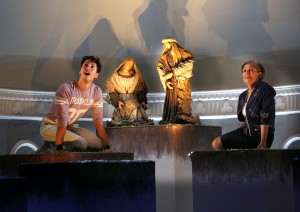good works: review
The last instalment of Darlinghurst Theatre Company’s 2015 season is Good Works, a captivating and complex play that dives into the lives of two Catholic families growing up in wartime Oz. The, sadly, deceased Australian playwright Nick Enright, writer of Property of the Clan and the stage adaptation of Tim Winton’s Cloudstreet, originally published Good Works in 1995. We follow the lives of two childhood friends, Tim (Stephen Multari ) and Shane (Anthony Gooley) as they grow up surrounded in a slew of abuse and criminal activity, yet with the shroud of religion hanging over their every move.
The Eternity Playhouse, the newly renovated home of Darlinghurst Theatre Company, seems perfectly apt for the staging of Good Works. With an archway clouding the back of the stage and a modern yet quiet infrastructure, the theatre itself has spiffed up well. Good Works thus settles in nicely, and further staging of undulating pillars covered in grass and dirt and various props becomes reminiscent of some sort of organic church, lost and left to rot in that damp dark forest of time itself.
Backed by an unassuming and confident cast, including Toni Scanlan, Taylor Fergunson, Lucy Goleby, and Jamie Oxenbould, Good Works takes you on a roller coaster ride from the get-go. Most actors play various characters and we are left with little to no room for stagnancy because of the speed in which changes occur; sometimes within one sentence a different character emerges. This makes the play immediately unique and engaging, and also means that the talented stamp of Enright is easily visible. It’s a breathe of fresh air, but admittedly, a type of breathing that traditional theatre-goers may not be able to muster.
In a religious context, the term “good works” means that if you do good and decent things you will receive an added bonus of good grace when it’s time to be taken to the high heavens. In the play, then, each character fights against what religion and others want of them, only to find that in this race to please those around them they have lost track of themselves and what they truly desire.
Director Iain Sinclair states in his opening director’s note that Good Works has us exploring a “kaleidoscope of brutal truths, awful betrayals and exquisite mysteries.” While this statement is most definitely true, there are more elements within these layers than could ever be explained, something in which only the experience of being there can really do. We begin to reminiscence on our own experience whilst attempting to understand the actions and beliefs of those on stage, while all the while we are uncovering parts of ourselves that we have, as of yet, not tried to understand.
This is the true job of theatre itself; to keep you wanting and asking for more because you believe that amidst the lights and the lines you will find what you are looking for, in the real-time, immediate space of the stage. You hope that that lost desire will be revealed to you in some form beneath the lips of each actor. Yet what you find is never what you originally seek, and as with most of Enright’s work, we begin to realise that this might be exactly what direction he’s trying to make us go. Because, God forbid (pun intended), that anything in life goes the way we want it to.


